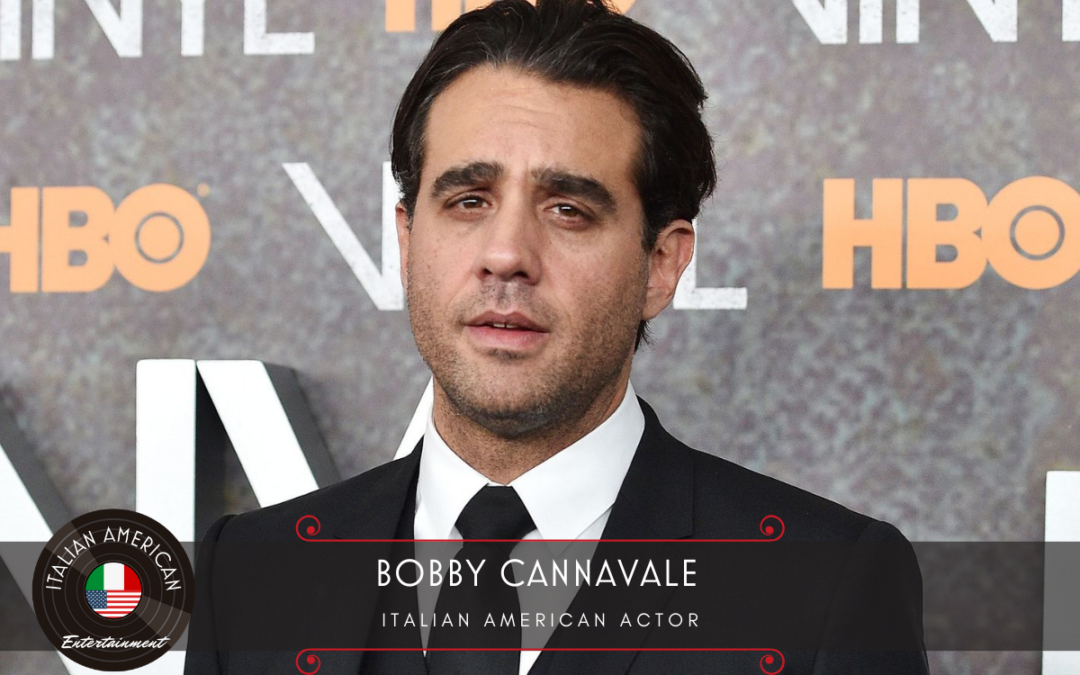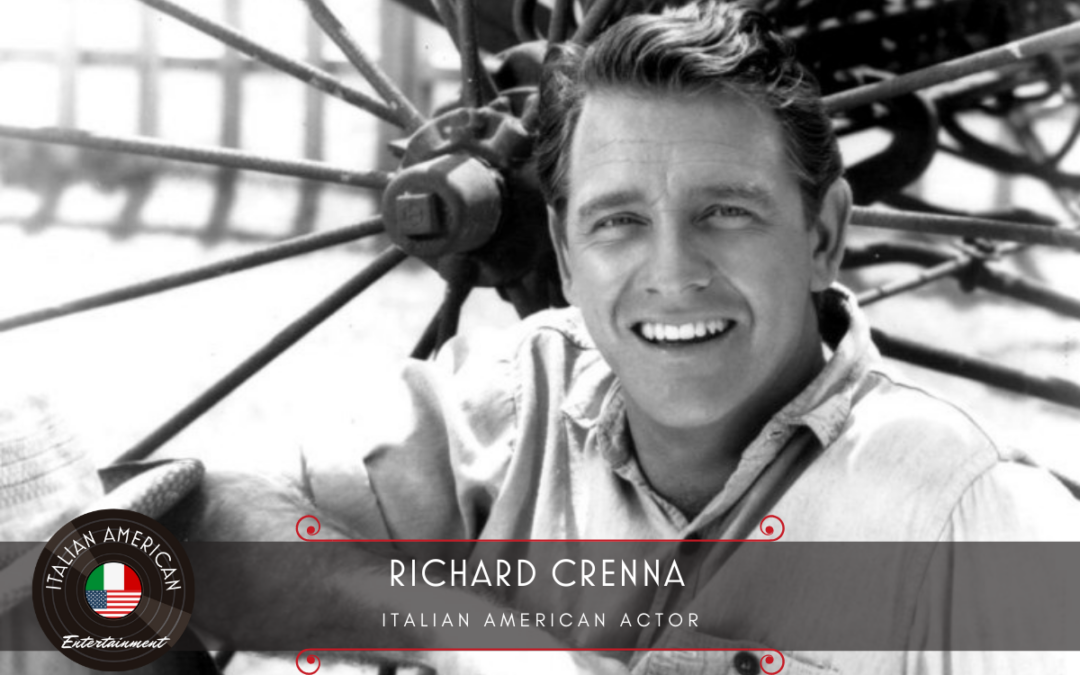
by Vince Chiarelli | Feb 8, 2021 | Podcasts
On this episode of The Italian American Entertainment Podcast, Vince Chiarelli, of The Vince Chiarelli Band, interviews the great singer and entertainer Daniela Crocco. Daniela is a member of the Chicago singing group, The Jersey Girls, and has performed throughout the United States, at all types of venues and Italian festivals.
Find out more about Daniela at the links below!
The Jersey Girls Website – https://www.jerseygirlslive.com/
Daniela’s Website – https://danielacrocco.com/

by Vince Chiarelli | Feb 6, 2021 | Film, Television
Robert Michael Cannavale was born and raised in Union City, New Jersey, the son of Isabel and Salvatore “Sal” Cannavale. His father is of Italian descent, while his mother is Cuban and moved to the U.S. in 1960. He was raised Catholic and attended St. Michael’s Catholic School, where he participated in a number of extracurricular activities, including being an altar boy and member of the chorus. When he was eight, Cannavale secured the plum role of the lisping boy, Winthrop, in his school’s production of The Music Man and later played a gangster in Guys and Dolls, which cemented his love for performing. Cannavale’s parents divorced when he was 13 and his mother moved the family to Puerto Rico. After two years in the American territory, they settled in Margate, Florida. After being kicked out of his high school in Florida during his senior year, Cannavale returned to New Jersey in order to be closer to New York to launch his acting career and went to summer school to earn a diploma from Union Hill High School.
Cannavale began his acting career in the theater – with no acting training – and gained early film roles in Night Falls on Manhattan (1997) and The Bone Collector (1999), Cannavale became well known when he starred as Bobby Caffey for two seasons on Third Watch. Following this, in 2001, he starred with Alan Arkin in 100 Centre Street – which was written and directed by Sidney Lumet, his then-father-in-law.
In 2002, he joined the cast of Ally McBeal for the last five episodes, but the show was then cancelled. Following this, he starred with Yancey Arias and Sheryl Lee in the miniseries Kingpin. In 2003, Cannavale briefly appeared on the last two episodes of Oz. He also appeared in the film The Station Agent as a man who befriends a little person removed from society. From 2004 to 2006, he had a recurring guest role on Will & Grace as Vince D’Angelo, the boyfriend (and eventual husband) of Will Truman (Eric McCormack). However, in the reboot, they are revealed not to be married. For this role, he won the Primetime Emmy Award for Outstanding Guest Actor in a Comedy Series in 2005. He has also appeared in the films Snakes on a Plane, The Guru (2002), Shall We Dance? (2004) and Romance & Cigarettes (2005), and guest starred in Sex and the City, Six Feet Under, Oz, Law & Order – and its spin-off series Law & Order: Criminal Intent and Law & Order: Special Victims Unit. He appeared in “The Other Guys” 2010 The Take (2007) alongside John Leguizamo and Tyrese Gibson, as Agent Steve Perelli.
In 2008, he received a Tony Award nomination for his role as Dennis in the Broadway play, Mauritius. In 2009, CBS announced Cannavale would reprise his role of Det. Eddie Saccardo on the television show, Cold Case, for three episodes, starting with the third episode of Season 7.[13] Cannavale was also in the film Win Win in 2011, as Terry Delfino. He later starred in the Broadway play The Motherfucker with the Hat alongside Chris Rock and Annabella Sciorra. On May 3, 2011 (his 41st birthday), he was nominated for a Tony Award for his leading role in that production.
In 2012 and 2013, he guest starred in the fourth and fifth season of Showtime’s Nurse Jackie, for which he was nominated twice again for the Primetime Emmy Award for Outstanding Guest Actor in a Comedy Series in 2012 and 2013, as well as joining the cast of HBO’s Boardwalk Empire, portraying the psychopathic Sicilian gangster Gyp Rosetti in the third season. His performance on Boardwalk Empire won critical acclaim, earning him the Primetime Emmy Award for Outstanding Supporting Actor in a Drama Series in 2013. That same year he also played Lewis, a vengeful clown on Modern Family during the third season, for which he was nominated for Best Guest Performer in a Comedy Series at the 2nd Critics’ Choice Television Awards in 2012. TV Guide, in its “Cheers & Jeers 2012” issue, praised Cannavale for this “trifecta of great performances”, commenting, “This guy is so good at playing bad, it’s scary.” He played what Matt Zoller Seitz of RogerEbert.com called a “heroically moving” lead role in Danny Collins in 2015.
Since 2015, Cannavale has been involved with voice-over work for Playing On Air, a non-profit organization that “records short plays [for public radio and podcast] written by top playwrights and performed by outstanding actors.” He has starred in three short plays, including Crazy Eights by David Lindsay-Abaire, co-starring Rosie Perez and John Leguizamo; Mere Mortals by David Ives; and 2 Dads by David Auburn.
From 1994 to 2003, Cannavale was married to actress/screenwriter Jenny Lumet – director Sidney Lumet’s daughter and performer Lena Horne’s granddaughter – with whom he has a son, actor Jake Cannavale. Cannavale and Jake were cast as father and son in season four of Nurse Jackie.
Since 2012, Cannavale has been in a relationship with actress Rose Byrne. Cannavale and Byrne’s first child, Rocco Robin Cannavale, was born on February 1, 2016. He and Byrne had their second child together, a son named Rafa, in November 2017.
Source

by Vince Chiarelli | Feb 2, 2021 | Musicians
Susan Kay Quatro[ was born and raised in Detroit. Her paternal grandfather was an Italian immigrant to the U.S.. Her family name of “Quattrocchi” (“four eyes”, meaning “bespectacled”) was shortened to Quatro.
She was influenced at the age of six by seeing Elvis Presley perform on television. She has said that she had no direct female role models in music, but was inspired by Billie Holiday and liked the dress sense of Mary Weiss of the Shangri-Las “because she wore tight trousers and a waistcoat on top – she looked hot”.
Quatro received formal training in playing classical piano and percussion. She taught herself how to play the bass and guitar. Her father gave her a 1957 Fender Precision bass guitar in 1964, which she still possessed in 2007.
Quatro played drums or percussion from an early age as part of her father’s jazz band, the Art Quatro Trio. Sources vary regarding whether her playing in the band began at the age of seven or eight, and whether the instrument she played was a drum kit or percussion (bongo or congas). Subsequently, she appeared on local television as a go-go dancer in a pop music series.
In 1964, after seeing a television performance by the Beatles, Quatro’s older sister, Patti, had formed an all-female garage rock band called the Pleasure Seekers with two friends.Quatro joined too and assumed the stage name of Suzi Soul; Patti Quatro was known as Patti Pleasure. Suzi would sing and play bass in the band. The band also later featured another sister, Arlene. Many of their performances were in cabaret, where attention was (initially) focused more on their physical looks than their actual music. They sometimes had to wear miniskirts and hair wigs, which Quatro later considered to be necessary evils in the pursuit of success. However, they would become well-known fixtures in the burgeoning and exploding Detroit music community.
The Pleasure Seekers recorded three singles and released two of these: “Never Thought You’d Leave Me” / “What a Way to Die” (1966) and “Light of Love” / “Good Kind of Hurt” (1968). The second of these was released by Mercury Records, with whom they briefly had a contract before breaking away due to differences of opinion regarding their future direction. They changed their name to Cradle in late 1969, not long after another Quatro sister, Nancy, had joined the band and Arlene had left following the birth of her child.
Quatro moved to England in 1971, after being spotted by the record producer Mickie Most, who had by that time founded his own label, Rak Records. Most had been persuaded to see Cradle by Michael, the brother of the Quatro sisters who had assumed a managerial role for the band. In common with many in the record industry at the time, Most was seeking a female rock singer who could fill the void that the death of Janis Joplin had created. According to the Encyclopedia of Popular Music, his attention to Quatro was drawn by “her comeliness and skills as bass guitarist, singer and chief show-off in Cradle.”
She had also been attracting attention from Elektra Records and subsequently explained that “According to the Elektra president, I could become the new Janis Joplin. Mickie Most offered to take me to England and make me the first Suzi Quatro – I didn’t want to be the new anybody.” Most had no interest in the other band members and he had no idea at that time of how he might market Quatro. She spent a year living in a hotel while being nurtured by Most, developing her skills and maturing. Most later said that the outcome was a reflection of her own personality.
Quatro’s first single, “Rolling Stone”, was successful only in Portugal, where it reached No. 1 on the charts. This was a solo effort, although aided by people such as Duncan Browne, Peter Frampton and Alan White. Subsequently, with the approval of Most, she auditioned for a band to accompany her. It was also after this record that Most introduced her to the songwriting and production team of Nicky Chinn and Mike Chapman, who wrote songs specifically to accord with her image. She agreed with Most’s assessment of her image, saying that his influence, at which some of his artists – such as Jeff Beck and Rod Stewart – balked, did not extend to manufacture and that “If he tried to build me into a Lulu, I wouldn’t have it. I’d say ‘go to hell’ and walk out.” This was the height of the glam rock period of the 1970s and Quatro, who wore leather clothes, portrayed a wild androgynous image while playing music that “hinged mostly on a hard rock chug beneath lyrics in which scansion overruled meaning.”
In 1972, Quatro embarked as a support act on a UK tour with Thin Lizzy and headliners Slade. Rak Records arranged for her to use Thin Lizzy’s newly acquired PA system during this, incurring a charge of £300 per week that enabled the Irish band to effectively purchase it at no cost to themselves. In May 1973, her second single “Can the Can” (1973) – which Philip Auslander describes as having “seemingly nonsensical and virtually unintelligible lyrics”:1 – was a No. 1 hit in parts of Europe and in Australia.
With the exception of Australia, her chart success faltered thereafter, as proven with her 1975 hit “Your Mamma Won’t Like Me”, which proved to be a moderate success in the UK. Further singles “I Bit off More Than I Could Chew” and “I May Be Too Young”, both failed to reach the UK Top 50. Quatro recorded an album in 1976 and released a new single in 1977 called “Tear Me Apart” which reached the UK Top 30, her first hit to have done so in three years. It would take another year for another big hit, this time with a change to a more mellow style giving Quatro a 1978 single “If You Can’t Give Me Love” that became a hit there and in the United Kingdom. Later that year, “Stumblin’ In”, a duet with Chris Norman of the band Smokie, reached No. 4 in the US. Both tracks were featured on the If You Knew Suzi… album. A year later, Quatro released Suzi … and Other Four Letter Words, but none of her other work had much US success. This featured the hits “She’s in Love with You”, which made No. 11 in Britain, “Mama’s Boy” (number 34), and “I’ve Never Been in Love” (number 56).
Quatro is possibly best known in the United States for her role as the bass player Leather Tuscadero on the television show Happy Days. The show’s producer, Garry Marshall, had offered her the role without having an audition after seeing a photograph of her on his daughter’s bedroom wall. Toby Mamis, who was acting as her U.S. representative at that time, helped broker the deal and generate enormous media attention to it, elevating Quatro’s profile in her home country. Leather was the younger sister of Fonzie’s former girlfriend, hot-rod driver Pinky Tuscadero. Leather fronted a rock band joined by principal character Joanie Cunningham. The character returned in other guest roles, including once for a date to a fraternity formal with Ralph Malph. Marshall offered Quatro a Leather Tuscadero spin-off, but she declined the offer, saying she did not want to be typecast.
In 2011, Quatro was inducted to the Michigan Rock and Roll Legends Hall of Fame.
source

by Vince Chiarelli | Jan 27, 2021 | Film, Television
Louis Jude Ferrigno Sr. was born in Brooklyn, New York, to Victoria and Matt Ferrigno, a police lieutenant. He is of Italian descent. Soon after he was born, Ferrigno says he believes he suffered a series of ear infections and lost 75 to 80% of his hearing, though his condition was not diagnosed until he was three years old. Hearing loss caused Ferrigno to be bullied by peers during his childhood: “They used to call me ‘deaf Louie, deaf mute’, because of my hearing and because of the way I sounded.”
Ferrigno started weight training at age 13, citing bodybuilder and Hercules star Steve Reeves as one of his role models. Because he could not afford to buy weights, he made his own using a broomstick and pails which he partially filled with cement. He was also a fan of the Hercules films that starred Reeves. Ferrigno attended St. Athanasius Grammar School and Brooklyn Technical High School, where he learned metal working.
After graduating from high school in 1969, Ferrigno won his first major title, IFBB Mr. America. Four years later, he won the title IFBB Mr. Universe. Early in his career he lived in Columbus, Ohio and trained with Arnold Schwarzenegger. In 1974, he came in second on his first attempt at the Mr. Olympia competition. He came in third the following year, and his attempt to beat Arnold Schwarzenegger was the subject of the 1977 documentary Pumping Iron. The documentary made Ferrigno famous.
These victories, however, did not provide enough income for him to earn a living. His first paying job was as a $10-an-hour sheet metal worker in a Brooklyn factory, where he worked for three years. He did not enjoy the dangerous work, and left after a friend and co-worker accidentally cut off his own hand one day.
Following this, Ferrigno left the competition circuit for many years, a period that included a brief stint as a defensive lineman for the Toronto Argonauts in the Canadian Football League. He had never played football, and was cut after two games. Ferrigno left the world of Canadian football after he broke the legs of a fellow player during a scrimmage. During competition, Ferrigno stood at almost 6 ft 5 in. Ferrigno competed in the first annual World’s Strongest Man competition in 1977, where he finished fourth in a field of eight competitors.
In 1977, Ferrigno was cast as the Hulk in The Incredible Hulk. Ferrigno continued playing the Hulk role until 1981—although the last two episodes were not broadcast until May 1982. Later, he co-starred in three The Incredible Hulk TV movies.
In November 1978 and again in May 1979 Ferrigno appeared in Battle of the Network Stars.
In 1983, Ferrigno appeared as John Six on the short-lived medical drama Trauma Center.
Ferrigno played himself during intermittent guest appearances on the CBS sitcom The King of Queens, beginning in 2000 and continuing until the program’s conclusion in 2007. He and his wife Carla were depicted as the main characters’ next-door neighbors. Because of his role as the title character on The Incredible Hulk, he is often the target of Hulk jokes by Doug and his friends.
He made cameo appearances as a security guard in both the 2003 film Hulk and the 2008 film The Incredible Hulk, in which he also voiced the Hulk. In the latter film, Bruce Banner (Edward Norton) bribes him with a pizza in order to gain entry into a university building. He has continued to voice the Hulk in Marvel Cinematic Universe films, uncredited. He continued to be known as the voice of the Hulk until 2015’s Avengers: Age of Ultron. Ferrigno himself has been replaced by Mark Ruffalo since the 2012 film The Avengers as the voice of the Hulk.
Source

by Vince Chiarelli | Jan 20, 2021 | Uncategorized
Richard Crenna was born November 30, 1926, in Los Angeles, the only child of Edith Pollette, who was a hotel manager in Los Angeles, and Dominick Anthony Crenna, a pharmacist. His parents were both of Italian descent.
Following high school, Crenna served in the U.S. Army during World War II, serving in the infantry as a radioman, where he saw combat in Belgium during the Battle of the Bulge (late 1944 – early 1945). He also briefly served in the Pacific Theater of World War II processing intercepted Japanese radio messages.
After World War II, Crenna attended the University of Southern California, where he earned a bachelor of arts degree in English literature and was a member of the Kappa Sigma fraternity.
Crenna got his acting start on radio. In 1937, he had gained his first role, that of “the kid who did everything wrong” on Boy Scout Jamboree, a show on which he continued to appear occasionally in numerous roles until 1948. In the following year, he started playing Walter “Bronco” Thompson on The Great Gildersleeve, a role he played until 1954. He also originated the role of geeky Walter Denton on the Radio Comedy Our Miss Brooks alongside Eve Arden and Gale Gordon in 1948, and followed that role when the series moved to television in 1952. He remained in that role until 1957. He appeared as a delivery boy in My Favorite Husband (episode “Liz Cooks Dinner for 12”), was Oogie Pringle on A Date With Judy (episode “The Competitive Diet”, among several other episodes of the show) and as a teenager on The George Burns and Gracie Allen Show (episode “Watching the Neighbor’s Daughter”.)
As previously mentioned, Crenna played Walter Denton on radio’s Our Miss Brooks, remaining with the cast when it moved into television in 1952. He remained with the show until it was canceled in 1957. He guest-starred on the I Love Lucy episode “The Young Fans”, with Janet Waldo and on NBC’s 1955–56 anthology series Frontier, in the lead role of the episode entitled “The Ten Days of John Leslie”. In 1955, he was the guest star on The Millionaire in the episode “The Ralph McKnight Story”.
When the Our Miss Brooks TV series was canceled in 1957, Crenna was searching for a new series to showcase his talent. Crenna then joined the cast of the comedy series The Real McCoys, as Luke McCoy – alongside veteran actor Walter Brennan, who played Grandpa Amos McCoy. Kathleen Nolan was cast as his young wife, Kate McCoy. Crenna ultimately became one of the series’s four directors during its six-year run (1957–63).
In the 1960s, Richard Crenna directed many episodes of The Andy Griffith Show and was credited as “Dick Crenna”. He also directed episodes of Lou Grant, which ran on CBS from 1977–82.
Crenna portrayed California state senator James Slattery in the CBS-TV series, Slattery’s People (1964–65). For his acting in this series, he was twice nominated for an Emmy Award with slightly different names: for “Outstanding Individual Achievements in Entertainment” and for “Outstanding Continued Performance by an Actor in a Leading Role in a Dramatic Series”, both in 1965. Crenna was also nominated for a Golden Globe Award for “Best TV Star – Male” for this same role, again in 1965. In 1966, Crenna played beside Steve McQueen as an ill-fated captain of an American gunboat in 1920s China in The Sand Pebbles.
During the 1970s, Crenna continued acting in such Western dramas such as The Deserter, Catlow, The Man Called Noon, and Breakheart Pass. He made a notable performance in Jean-Pierre Melville’s final film Un Flic in 1972. In 1976, Crenna returned to weekly network television in the Norman Lear CBS sit-com All’s Fair, a political satire co-starring Bernadette Peters. Despite high expectations and good critical reviews, it lasted just a single season. The 1978 NBC-TV miniseries, Centennial, based on James A. Michener’s historical novel Centennial, saw Crenna in the role of deranged religious fanatic Colonel Frank Skimmerhorn, who ordered the 1864 massacre of Colorado American Indians.
Crenna won an Emmy Award and a Golden Globe Award for Best Performance by an Actor in a Mini-Series or Motion Picture Made for Television nomination for his performance in the title role of the 1985 film The Rape of Richard Beck.
Crenna then played John Rambo’s ex-commanding officer, Colonel Sam Trautman, in the first three Rambo films, a role for which he was hired after Kirk Douglas left the production a day into filming. Trautman became the veteran actor’s most famous role; his performance received wide critical praise. He also spoofed the character in Hot Shots! Part Deux in 1993.
Crenna was awarded a star on the Hollywood Walk of Fame at 6714 Hollywood Boulevard.
Crenna developed pancreatic cancer and died of heart failure at age 76 on January 17, 2003.
Source





